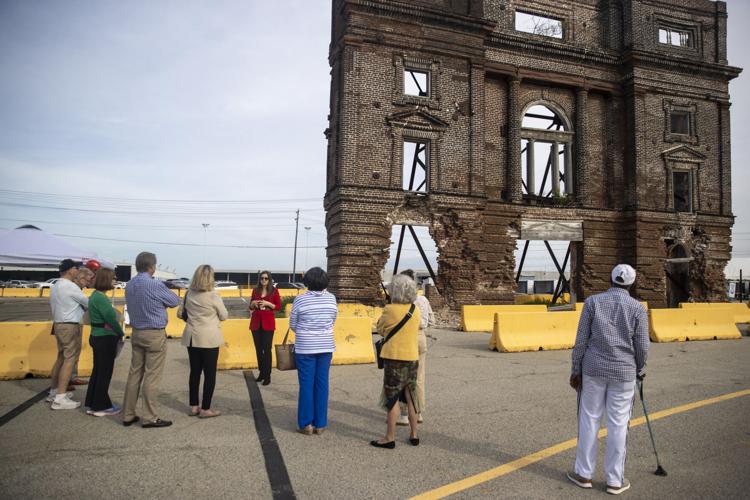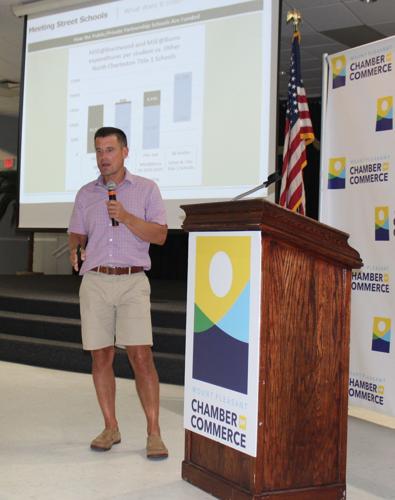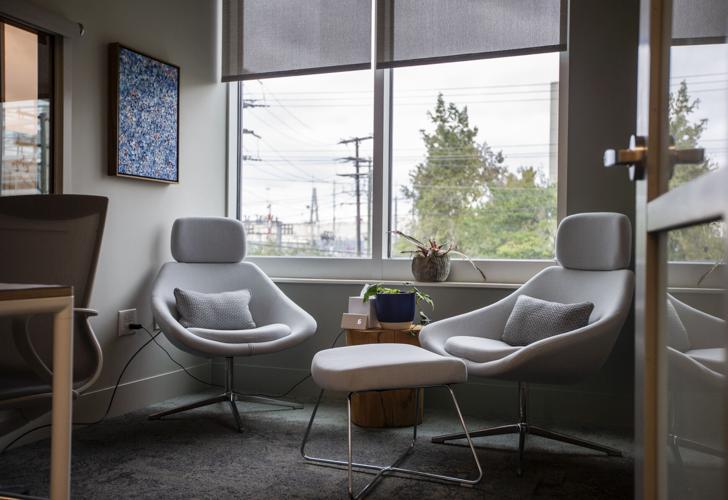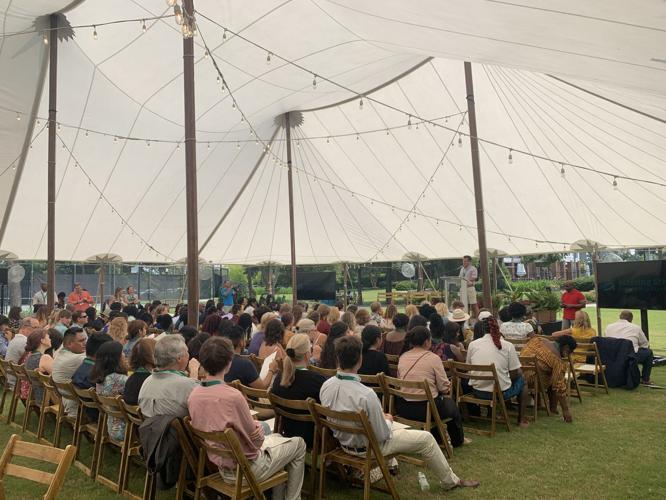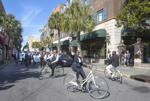Charleston businessman and philanthropist Ben Navarro’s purchase of Union Pier will significantly expand his footprint in the Holy City, likely making him the owner of the largest amount of private property on the lower peninsula.
Navarro is intensely private and keeps his profile low. But he’ll take on a lead role in redeveloping this prominent stretch of waterfront land at the center of a feverish, years-long debate.
The State Ports Authority on March 19 unanimously approved selling him the 65-acre site between Concord and Laurens streets that currently functions as a cruise ship terminal and massive concrete parking lot.

Ben Navarro. Provided
The SPA declared its faith in Navarro to transform the property into a bustling centerpiece of the city, balancing green space with residential development, including some affordable housing.
In Navarro’s words, he envisions “a neighborhood that Charleston deserves.”
Navarro has a track record of civic engagement. He and his wife Kelly have donated millions of dollars to improving education opportunity and access across South Carolina. And he helms a burgeoning hospitality empire in Charleston, where he’s lived for the last two decades.
Under Beemok Capital, a family office that invests his personal wealth, Navarro collected assets in the fast-growing city: a stadium, hotels, restaurant space and a historic theater.
Navarro’s investments have meant that prominent properties in Charleston are now in the hands of a local owner — an important factor in his decision to take on Union Pier: “This project needs a long-term steward, not an out-of-town developer,” he wrote in a March 19 op-ed appearing in The Post and Courier.
Navarro declined to be interviewed for this story. Beemok Capital provided a written statement outlining Navarro’s holdings, business ventures and philanthropic efforts in response to questions from the newspaper.
The makeover of Union Pier — seen as the last large piece of developable land on the peninsula — will be a challenging, and potentially transformative, opportunity for Navarro and the city.
“We insist on excellence in everything we do because these projects are my legacy and that of my family,” he wrote in the statement released by his office. “We will always care differently than any corporate investor.”
Investing in education
Navarro has called the Holy City home since 2004, when he moved his family and his business from New York.
He started his global investment company Sherman Financial Group in 1997 after a number of years on Wall Street. The company, named after the family dog, originates, purchases and services consumer and commercial debt.
Most of Sherman Financial’s revenue comes from Credit One Bank, which it bought in 2005. The Las Vegas-based bank and financial services company specializes in offering a range of credit cards, including for people with low credit scores, through the Visa, American Express and Mastercard networks.
In his statement, Navarro said he and Beemok Capital leaders are grateful to be at a point where they can focus on community projects and philanthropic efforts that drive positive change in peoples’ lives.
The bulk of that focus is on Charleston — the city that quickly enamored Navarro and his wife Kelly.
“It felt like home for us after only a week,” he told the newspaper in 2018. “It’s an unbelievably great place to raise a family, and the people have been incredibly welcoming. And we feel like we’ve been able to find a role in the community that’s meaningful.”
Navarro started Meeting Street Schools in 2008, based on the belief that all children deserve access to a good education regardless of their socioeconomic status or geographic location. The nonprofit’s first school on King Street served 45 preschoolers and their families.
The organization has since ballooned.
The flagship Meeting Street Academy enrolls around 360 students, pre-K through third-graders. The independent school, located at 642 Meeting St., provides year-round education with an extended day option and summer programming.
The nonprofit entered a public-private partnership in 2014 with the Charleston County School District. Under the innovative model, public schools in high-poverty neighborhoods receive the usual per-student state and federal dollars. But Meeting Street pumps more money into the schools, allowing for improvements like two teachers per classroom, comprehensive mental health and social-emotional support, and afterschool and summer programs.
Meeting Street opened two partner locations in Charleston, one in Spartanburg and another in Ridgeland. The elementary schools have been praised for their strong academic results. Former Gov. Nikki Haley once remarked she wished every school in South Carolina looked like Meeting Street Academy.
Dot Scott, a past president of the NAACP’s Charleston branch, called Navarro her hero. She got involved during the initiative’s early days and remembers being skeptical of both the businessman and his idea.
Scott has seen enough people make promises they don’t keep, or have ulterior motives, she said. When she first met Navarro, she didn’t expect him to pay attention or invest in the predominantly Black communities he said he wanted to help.
Scott judges people by what they do, not what they say, she said. And as the Meeting Street Academy initiative unfolded, she watched as Navarro’s words matched his actions.
“What is there not to just love about someone that’s so engaged and concerned about educating these young people?” Scott said. “We are blessed for him to be here to do what he’s doing.”
Navarro was an early supporter of Charleston Coalition for Kids, an advocacy group formed five months before the 2018 local school board election. The nonprofit, which backs certain candidates, has come under fire for its refusal to disclose its funders.
The businessman doubled down in 2020 on his commitment to closing the opportunity gap with the Meeting Street Scholarship Fund. Public high school graduates in select counties can apply for the need-based scholarship, which covers up to $10,000 each year in college tuition costs. Recipients must attend an eligible South Carolina university and qualify for state and federal scholarships.
Private donors have spent at least $4 million helping more than 550 students pay for school. The fund announced its goal last year to expand the scholarship to each of South Carolina’s 46 counties.
In 2021, Navarro and his wife donated $1.25 million to boost College of Charleston’s teacher education programs. The same year, Meeting Street started its Excellence in Teaching Awards program.
The initiative awards bonuses to teachers across five public school districts whose students make significant improvements in math and reading. The program reimagines South Carolina’s outdated teaching compensation structure of paying for experience rather than excellence, Navarro said in his statement.
Recipients in 2023 received an average bonus size of $15,000; the top-performing teacher earned more than $50,000, he said.
Championing wellness
Navarro is an avid biker, tennis enthusiast and yoga fan. Health and wellness are important to him; so is normalizing mental illness.
The businessman partnered with the Medical University of South Carolina to launch Modern Minds in 2020, amid the COVID-19 pandemic. The clinic takes a whole-body approach to treating anxiety and depression, according to its website. It offers traditional therapy in addition to pairing patients with a wellness mentor who focuses on areas like diet, socialization and movement.

A consultation room inside Modern Minds offices Tuesday, Sept. 15, 2020, in Charleston. Modern Minds is a mental health and wellness clinic offering patients a whole body approach to therapy. Gavin McIntyre/Staff
Wellness was at the center of a more than $50 million renovation funded by the Navarros to the Credit One Stadium on Daniel Island. The property is home to the Credit One Charleston Open, the largest women's only pro tennis tournament in North America. Navarro purchased the event — then called the Volvo Car Open — in 2018 from outside owners.
Navarro bid that same year for the NFL’s Carolina Panthers. He grew up playing football and watching his dad coach at Princeton University and other schools. The team ultimately went to hedge fund owner David A. Tepper for $2.2 billion.
Navarro didn’t regret his attempt.
“For me, it just came down to my resources and time going into one thing versus being able to have a much more diverse set of activities,” he told The Post and Courier at the time.
Navarro pumped some of his money into Credit One Stadium’s massive facelift. The renovations, completed in April 2022, included a multi-story space with premium locker rooms plus physical therapy and exercise space for players. Capacity expanded to 11,000, with the venue hosting music superstars Stevie Nicks, Elton John and Chris Stapleton in recent years.
Navarro’s daughter Emma frequents the stadium, too. The 22-year-old professional tennis player — currently ranked No. 20 in the world — is expected to return to her hometown when the Credit One Open begins March 30.
Boosting tourism
The stadium is one of several Navarro-controlled properties fueling Charleston’s tourism economy.
The businessman announced a string of initiatives beginning in 2021 under Beemok Hospitality Collection, an affiliate of Beemok Capital. He bought The Charleston Place, a massive hotel and retail complex bound by King, Meeting and Market streets.
His purchase included the Riviera Theater across the street. Originally built in 1939, the art-deco theater reopened in 2022 with a focus on concerts and other performances instead of films.
“Part of what our goal was was to animate those crossroads in Charleston, bring life to that area that attracts locals in particular and bring them back to the center of town,” Beemok Hospitality President Casey Lavin previously told the newspaper.
Former Charleston Mayor Joe Riley had a similar mission in the 1980s when he pushed for The Charleston Place’s development. He hoped it would revive a dilapidated downtown. The hotel became a catalyst of revitalization when it opened in 1986, sparking investment in properties around its King Street location.
The iconic hotel with around 430 rooms is often cited as today’s crown jewel of Charleston’s booming hospitality industry; Condé Nast Traveler editors placed it on the magazine’s worldwide “Gold List” of top getaway destinations for 2024.
Navarro’s hospitality group initially acquired a majority stake in The Cooper, a luxury hotel project spearheaded by the Los Angeles-based developer Lowe. Beemok Hospitality later bought the entire hotel. The Concord Street property has around 200 rooms and will feature waterfront dining, a rooftop bar, its own pier and an extension of the adjacent Waterfront Park.
It’s expected to open next year, and will neighbor Union Pier.
The businessman announced in 2022 his company’s first stand-alone dining concept. Italian restaurant Sorelle welcomed patrons a few months later in a stretch of three historic townhomes on Broad Street.

The Charleston Place hotel has plans for a new open-air bar and terrace area.
Restaurants will be a central focus for the hospitality group as it looks ahead to The Cooper’s opening and to renovations at Charleston Place this year. Between the hotels and Sorelle, Beemok Hospitality will have nearly a dozen restaurants in its portfolio, Lavin said.
A short walk from the three properties is 141 Meeting St. — a 1.06-acre strip Navarro plans to transform into an urban park called American Gardens. The narrow lot runs all the way to King Street and is set to open by late 2025. Beemok Hospitality, which will fund the park’s day-to-day operations, envisions programming like free movie nights, jazz concerts and book readings.
Helen Hill, CEO of Explore Charleston, applauded Navarro’s “unwavering commitment to our community.”
“Ben and his team have consistently demonstrated a profound dedication to the city’s well-being, enhancing our focus on quality of life and economic diversity,” she said in a statement.
Beemok Capital counts a number of key partners in helping the company pursue its big ideas: Historic Charleston Foundation preservationists; state and local education officials; and City Hall leaders, to name a few.
“Our goal is to invest alongside these entities to enhance what they already provide in the community, and we will continue to do that at Union Pier,” Navarro said in his statement.
Clarification: This story has been updated to clarify the amount of money donors have given to the Meeting Street Scholarship Fund. It has also been updated to reflect that the city of Charleston owns Credit One Stadium. Beemok Hospitality lists the stadium among its assets, paid more than $50 million for its renovations and runs the venue's operations.

